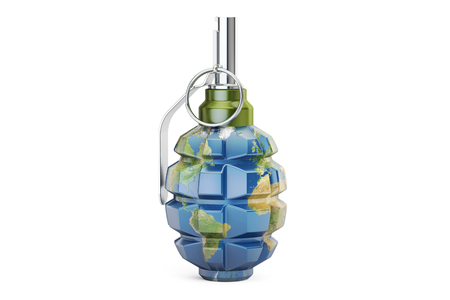Elizabeth LaPensée, an assistant professor at Michigan State University, created a game earlier this month called Thunderbird Strike that allows players to use lightning bolts to destroy pipelines and trucks. The video game is scheduled to debut at the imagineNATIVE film and media arts festival later this month.
The game’s mission starts in Alberta, Canada’s oil tar sands and winds through the Great ![]() Lakes, while the player defends what the developer calls Turtle Island “with searing lightning against the snake that threatens to swallow the lands and waters whole,” according to the game’s website.
Lakes, while the player defends what the developer calls Turtle Island “with searing lightning against the snake that threatens to swallow the lands and waters whole,” according to the game’s website.
Thunderbird Strike is designed to bring “awareness to pipeline issues and contribute to the discontinuation of [Enbridge’s] Line 5,” LaPensée told reporters earlier this month. She was referring to a Canadian oil pipeline that connects the country’s tar sands to the lower U.S.
Eco-activists targeted natural gas distribution company Enbridge last year. The oil transportation developer was forced to shut down one of its pipelines — Line 9 — connecting Sarnia, Ontario, to Montreal in 2016 for about four hours following protesters tampering with the pipelines’ switch-off valves. It was the fourth time in two months the company shuttered.
Enbridge Line 9 was developed in 2015 and delivers Eastern Canadian crude to Western Canadian refineries. The incident in 2016 began when three protesters shut down a valve and later chained themselves to fenced-in equipment on Line 9. The police later forced them off the property.
The court system is now taking a more lenient position in some cases involving pipeline sabotage efforts. A judge in Minnesota, for instance, is allowing four anti-pipeline activists who damaged an oil pipeline in Canada to present evidence supposedly showing the threat of climate change justified their actions.
Two of the activists admitted last month they coordinated with Climate Direct Action activists to shut down five oil pipelines in 2016 that carry tar sands crude from Canada to the U.S. The two activists now have the opportunity to argue the immediate gravity of climate change justified their actions.
Recent hurricanes and western wildfires in the U.S. are evidence that climate change is making natural disasters worse, the activists told reporters earlier this month, adding that Canada’s tar sands oil contributes disproportionately because it generates more carbon dioxide than other sources of fossil fuels.
This article originally appeared in The Daily Caller
